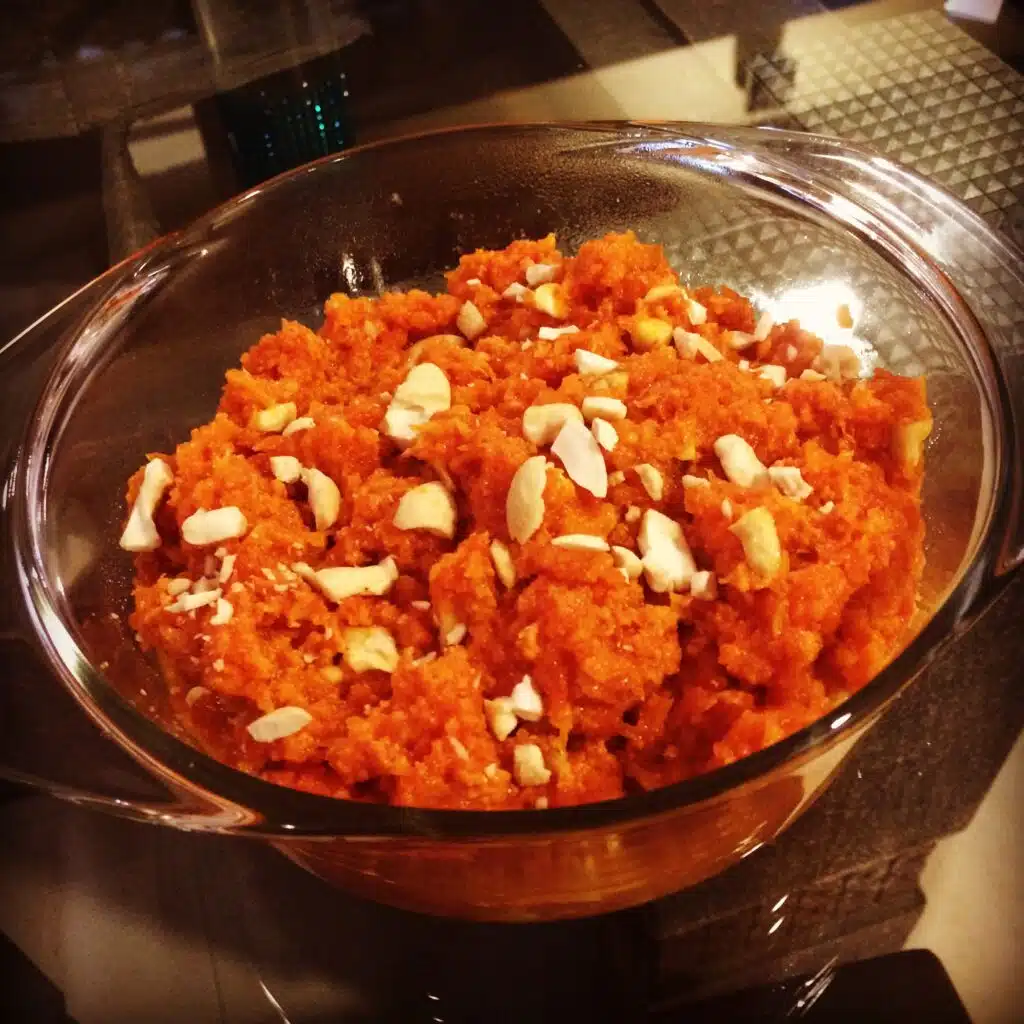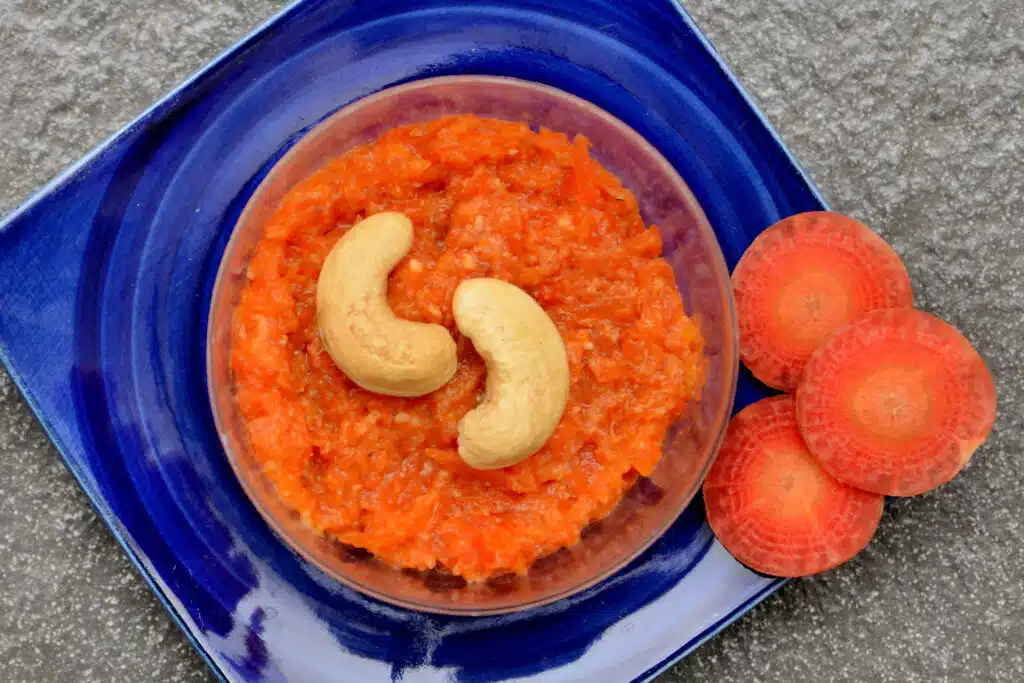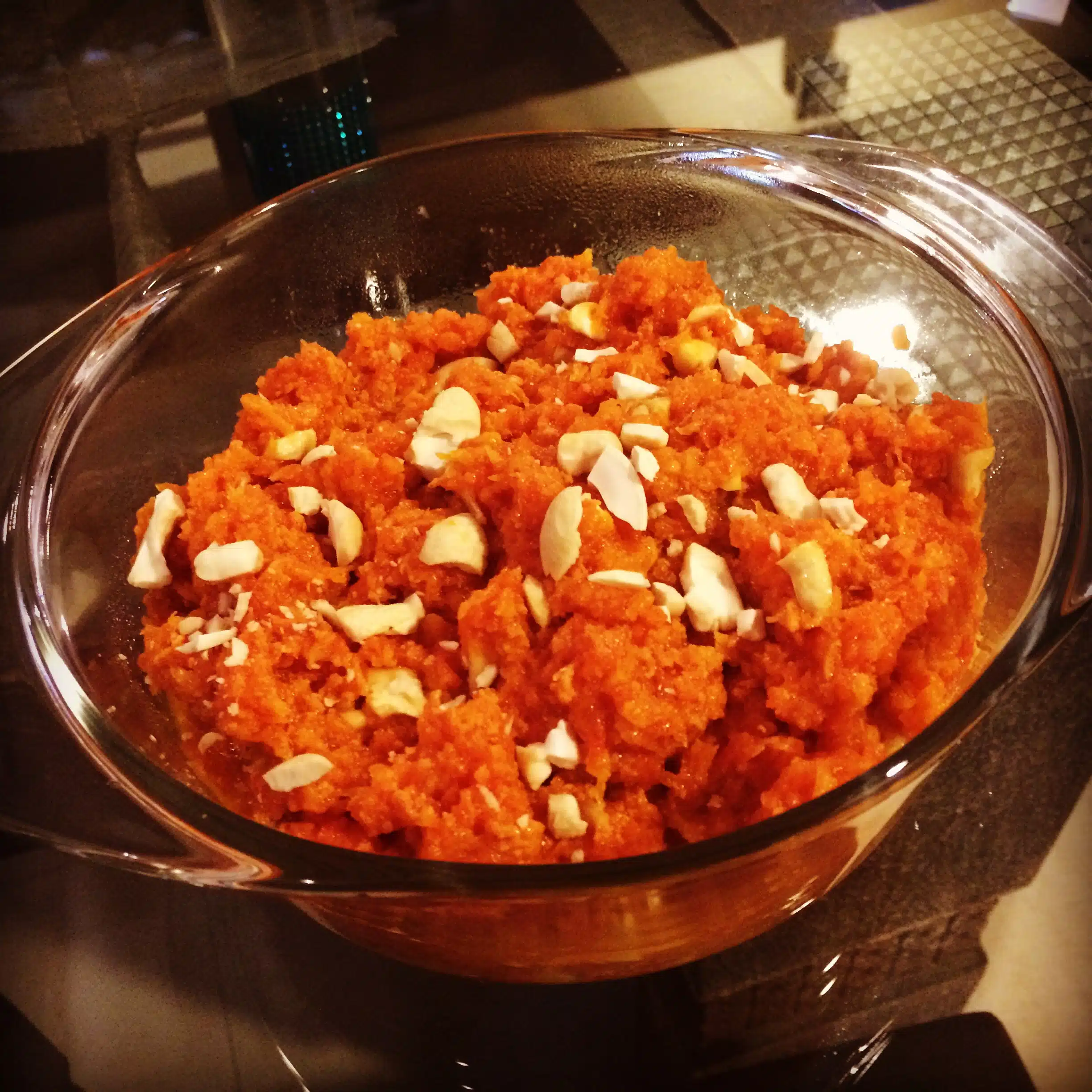Carrot halwa is an incredibly delicious Indian treat that is sweet, rich, and full of flavor.
It’s also packed with vitamins A, C, E, B6, K, niacin, riboflavin, pantothenic acid, folate, potassium, copper, manganese, phosphorus, iron, magnesium, zinc, selenium, and calcium.
You can even add fiber to your diet by adding this dish to your meals!
What Is Carrot Halwa?
Halva is another type of Indian dessert, but it has no dairy products in it whatsoever.
Halva is made from ground nuts like almonds, pistachios, cashews, walnuts, and peanuts, along with spices such as cardamom, cloves, cinnamon, nutmeg, ginger, fennel seeds, saffron, coriander seeds, cumin, turmeric, and black pepper.
In contrast, halwa contains all sorts of dairy products including butter, yogurt, cheese, cream, and eggs.
The word “halwa” actually means “sweetmeat” in Hindi language.
The most popular types of halwa are almond, sesame seed, semolina, date, and coconut.
But what about the carrot version?
Well, it is known as carrot halwa (or caroot halwa) because it uses shredded carrots instead of other types of nuts.
Carrots have a high water content, so they absorb more liquid than other nuts do when cooked.
This makes them perfect for making desserts where you want lots of moisture.
Another reason why people prefer using carrots over other kinds of vegetables is their sweetness.
They contain fructose sugars which make them sweeter than other fruits.
Carrots have been used since ancient times in India for medicinal purposes, and they were believed to cure ailments like constipation, dysentery, nausea, and diarrhea.
There are multiple ways to cook carrot halwa depending on how much time you have available.
However, the basic steps remain the same.
First, rinse the raw shredded carrots thoroughly under cold running water until all of the dirt is removed.
Then drain off any excess water.
Next, put the carrots into a large pot filled with enough water to cover the bottom completely.
Bring the water to a boil, then reduce heat to medium low and let simmer until soft and tender, usually around 30-40 minutes.
Depending on the size of the pot and the number of carrots you use, cooking time may vary slightly.
After the carrots are done, remove them from the pot and set aside.
Add half cup of room temperature unsalted butter to the empty pot.
Gently melt the butter over medium low heat.
Once melted, pour in 1/2 cup of sugar and stir until well mixed together.
Now, slowly pour in 2 cups of milk at once, stirring constantly until smooth.
Continue to stir until all lumps disappear and everything comes together nicely without sticking to the sides of the pan.
If necessary, increase the heat to medium.
When boiling again, continue stirring.
Keep stirring until the mixture thickens up considerably.
Remove from heat and allow to cool down before proceeding to step three.
Now, place the softened carrots back into the pot and mash them against the side of the pot with a wooden spoon.

Stir until they become creamy.
Keep stirring until there are no clumps left.
At this point, you might notice some caramelization happening on the surface of the carrots.
Don’t worry, this is normal.
Just keep stirring.
Add the remaining 1/4 cup of sugar and stir until dissolved.
Next, slowly pour in 3/4 cup of heavy whipping cream while continuing to stir vigorously.
Continue to stir until the mixture becomes very thick.
Remove from heat and allow to cool down.
As mentioned earlier, the mixture will thicken further after cooling.
Finally, transfer the cooled carrot halwa to a bowl and refrigerate overnight.
In the morning, whip the mixture with an electric beater until fluffy peaks form.
Serve chilled with a dollop of whipped cream or ice cream on top.

What Are The Ingredients In Carrot Halwa?
The most important ingredient in carrot halwa is carrots because they contain beta-carotene which converts into vitamin A when cooked.
Carrots also have high amounts of dietary fibers, antioxidants (like Vitamin C), minerals like phosphorous and potassium, and essential nutrients like protein, fat, carbohydrates, and water.
Other ingredients include whole milk, sugar, butter, cardamom powder, saffron threads, nutmeg, cinnamon stick, cloves, almonds, raisins, pistachios, cashew nuts, almonds, coconut oil, and honey.
You will need these items for carrot halwa:
- 1/4 cup unsalted butter
- 3 cups raw brown sugar
- 5 large carrots
- 1 1/2 cup whole milk
- 1 teaspoon ground cardamom
- Saffron threads
- 1/8 teaspoon freshly grated nutmeg
- 1 tablespoon finely chopped slivered almonds
- 1 tablespoon raisins
- 1 tablespoon pistachio kernels
- 1 tablespoon shredded unsweetened coconut flakes
- 2 tablespoons almond extract
- 2 tablespoons honey
- Almonds, pistachios, and shredded coconut flakes
These are optional ingredients but if you want them in your carrot halwa:
- Cinnamon sticks
- Cloves
- Cardamom pods
- Cashews
- Hazelnuts
- Raisins
- Pistachios
- Mango pulp
- Whipped cream
Make sure that the ingredients are at room temperature before starting to prepare your carrot halwa.
If not, put them in cold water until you get started cooking.
How Do You Make Carrot Halwa?
Here’s how to make carrot halwa from scratch.
- Heat two cups of water over medium heat until it comes to a boil.
- Add one cup of grated raw carrots to the boiling water and let them simmer for about 15 minutes (or until they become tender).
- Once the carrots have cooked down, remove them from the pot using a slotted spoon.
- Set aside on paper towels to drain excess liquid.
- In a saucepan, bring four cups of milk to a low boil.
- Remove it from the stove and set it aside to cool slightly.
- Once the milk has cooled, mix together two tablespoons of powdered sugar and one tablespoon of butter in a bowl.
- Slowly pour half of the warm milk into the mixture while whisking continuously.
- Continue pouring the milk into the bowl until all of the milk is used up.
- Mix thoroughly.
- Add three teaspoons of cardamom powder to the remaining milk along with two tablespoons of honey.
- Whisk vigorously to combine everything well.
- Return the pan back onto the stove and cook at a slow simmer.
- Stir frequently as the mixture thickens, making sure not to burn it.
- When the halwa starts to thicken, remove it from the heat and stir in the cooked carrots.
- Let sit for 5-10 minutes before serving.
What Is The History Of Carrot Halwa?
The origin of carrot halwa goes back hundreds of years ago in India, where it was known as “halva.”
Halva is actually a type of fudge-like confectionery that originated when the Indians added ground sesame seeds to cooked rice flour.
The addition of sesame seeds gave the halva its unique texture, which would later become a key component of many other desserts such as kheer (rice pudding) and laddoo (coconut candy).
As time went on, people began using different ingredients like dried fruits, nuts, and vegetables to create new dishes from the original halva base.
These changes were intended to improve the taste of the original version and to create something more palatable for Western tastes.
In the early 1900s, bakers in India started experimenting with various types of sweets made out of coconut and cashew butter.
As they experimented, these bakers found that combining them with fresh grated carrots created a tasty, nutritious, and healthy alternative to traditional desserts.
From there, it only took one generation before carrot halwa became a staple at every family dinner table in India.
In fact, if you ask someone who grew up eating this Indian delicacy, they will probably tell you that it has been part of their daily routine since childhood.

Why Is Carrot Halwa So Popular?
There are several reasons why you should try carrot halwa for yourself.
First off, it tastes incredible.
The combination of sweetness from the syrup, spices, and sugar, combined with the tanginess of the carrots, makes this food stand out as one of the best desserts around.
Another reason why people love carrot halwa is because it’s easy to make.
All you need to do is cut up some carrots, boil them down until they soften, then combine them with some other ingredients like almonds, cardamom, raisins, saffron, ginger, and cinnamon.
Once all these things come together, you have a deliciously sweet treat ready to eat!
How Many Calories Are In Carrot Halwa?
The average serving size for carrot halwa is 1 cup (250 mL), which contains about 190 calories.
However, if you eat more than one cup per day, you may want to decrease the amount of food you consume at each meal.
If you do decide to increase how much carrot halwa you have on hand, make sure you consult a nutritionist first.
Another thing to keep in mind is that there is no nutritional value associated with any type of processed carbohydrate like white flour.
In other words, when you choose to use white flour instead of whole grain products, you are essentially eating empty carbohydrates that will not provide any health benefits whatsoever.
Is Carrot Halwa Healthy?
If you love sweets, then carrot halwa is sure to be right up your alley.
The combination of carrots, milk, sugar, and ghee makes it very nutritious as well as extremely tasty for those who like their desserts sweet without feeling guilty about their calorie intake.
In fact, if you want to eat less sugar but still satisfy your sweet tooth, carrot halwa is ideal because it contains only 1 gram of sugar per serving (about half teaspoon).
If you have diabetes, however, you should check with your doctor before consuming any type of food containing sugar.
There is no evidence that carrot halwa has negative effects on health, except perhaps for people who suffer from lactose intolerance.
Lactose is found naturally in dairy products such as milk, yogurt, butter, cottage cheese, and sour cream.
People who do not digest lactose properly may experience intestinal discomfort after eating foods high in lactose content, including carrot halwa.
As long as you don’t overdo it when enjoying carrot halwa, there is no reason why you shouldn’t enjoy its creamy texture and sweet taste while keeping your overall nutrition goals in mind.
You will find more information below about how much protein, fat, carbohydrates, and sodium are contained within one portion of carrot halwa.
What Are The Benefits Of Eating Carrot Halwa?
Carrot halwa has many health perks, including being high in antioxidants which protect against cancer and heart disease.
Carrots contain beta-cryptoxanthin, lutein, zeaxanthin, lycopene, phytonutrients, vitamin A, and vitamin C.
These nutrients help improve vision, reduce inflammation, prevent macular degeneration, lower blood pressure, boost immune system function, increase bone density, and promote good cardiovascular health.
The antioxidant content of carrot halwa makes it extremely beneficial for people who have diabetes because it may inhibit glucose absorption from food.
In addition, the combination of carrots, almonds, raisins, ginger, cardamom pods, pistachios, cashews, cinnamon, cloves, and saffron make it a great source of protein, carbohydrates, fat, and dietary fiber.
Boosts Your Immune System
Halva is one of the most nutritious foods you can eat if you want to keep yourself healthy.
The spices used in making halva include garlic, onion, turmeric, coriander seeds, cumin, fennel seed, nutmeg, mace, pepper, clove, caraway, basil leaves, and rose petals.
All these ingredients help boost your immune system while increasing circulation throughout your body.
When you prepare carrot halwa, you will be consuming all those above mentioned nutrients and boosting your immune system at the same time.
If you suffer from allergies, you should avoid using fresh ginger as part of the mix.
Ginger contains histamine and may cause allergic reactions when combined with other ingredients like wheat flour and nuts.
Helps Prevent Cancer
Many studies show that carrots help reduce risk factors associated with cancer development.
One study showed that women who ate more than four servings of vegetables per day had reduced rates of developing breast cancer.
Another study found that menopausal women who consumed about five cups of raw carrots daily were less likely to develop colon cancers.
In addition, carrots are known to help fight prostate cancer.
Studies suggest that carrots contain quercetin and kaempferol, two compounds that act as anti-inflammatory agents, helping to block tumor growth.
Quercetin is also proven to decrease cell proliferation (the process where cells replicate) and induce apoptosis (a type of programmed cell death).
Apoptosis helps slow down tumor formation and growth.
Reduces Heart Disease Risk Factors
Carrot halwa is very low in saturated fats and cholesterol but high in monounsaturated fats.
Monounsaturated fats are considered “good” fats since they do not raise total cholesterol levels in the bloodstream.
They also help lower triglyceride levels which are linked to higher risks of stroke and heart attack.
Carrot halwa is also high in dietary fiber.
Fiber is important for lowering bad LDL cholesterol levels and regulating bowel movements so it’s always best to consume plenty of fruit and vegetable fibers.
Are There Any Side Effects Of Eating Carrot Halwa?
This dessert has no known side effects, but if you have allergies or other dietary restrictions, it might be best for you not to consume it.
Halva (also called halwah) contains lots of dairy products like butter, cheese, yogurt, and sour cream which some people may find difficult to digest.
If you do have trouble tolerating these ingredients, try making carrot halwa without them.
You can make up for the lack of dairy in this recipe by using non-dairy alternatives such as almond milk, coconut oil, or rice milk instead of regular cow’s milk.
Another way to reduce its fat content would be to use less ghee or butter when cooking it.
Just remember to keep track of how many grams of saturated fats are in each serving so you don’t exceed your daily recommended intake.
How Much Carrot Halwa Should You Eat Per Day?
The American Heart Association recommends consuming no more than 2 cups (500 mL) of fruit daily.
So if you are looking for a way to get some extra calories into your diet without having to count them, then carrot halwa is the perfect solution.
However, it is important not to overdo it on carbohydrates as they are high in carbs and sugars.
If you want to lose weight, then stick to one serving at a time.

Equipment
- 1 Pot
Ingredients
- 500 g carrots
- 500 ml whole milk
- 100 g sugar
- 6 cardamom pods
- 1 raisins
- 25 g ghee
Instructions
- In a heavy-bottomed skillet over high heat, combine the shredded carrot and milk. Bring to a boil.
- After boiling, reduce the heat to medium-low and simmer the mixture while stirring often until the majority of the liquid has evaporated. About 30 minutes will pass throughout this.
- As you cook, whisk in the sugar, cardamom seeds, and raisins (or sultanas). This prevents the mixture from catching. Finally, stir in the ghee and boil the mixture until it turns a rich, creamy orange.
- Before serving the halwa with a scoop of vanilla ice cream and chopped pistachio nuts, let it cool somewhat.
